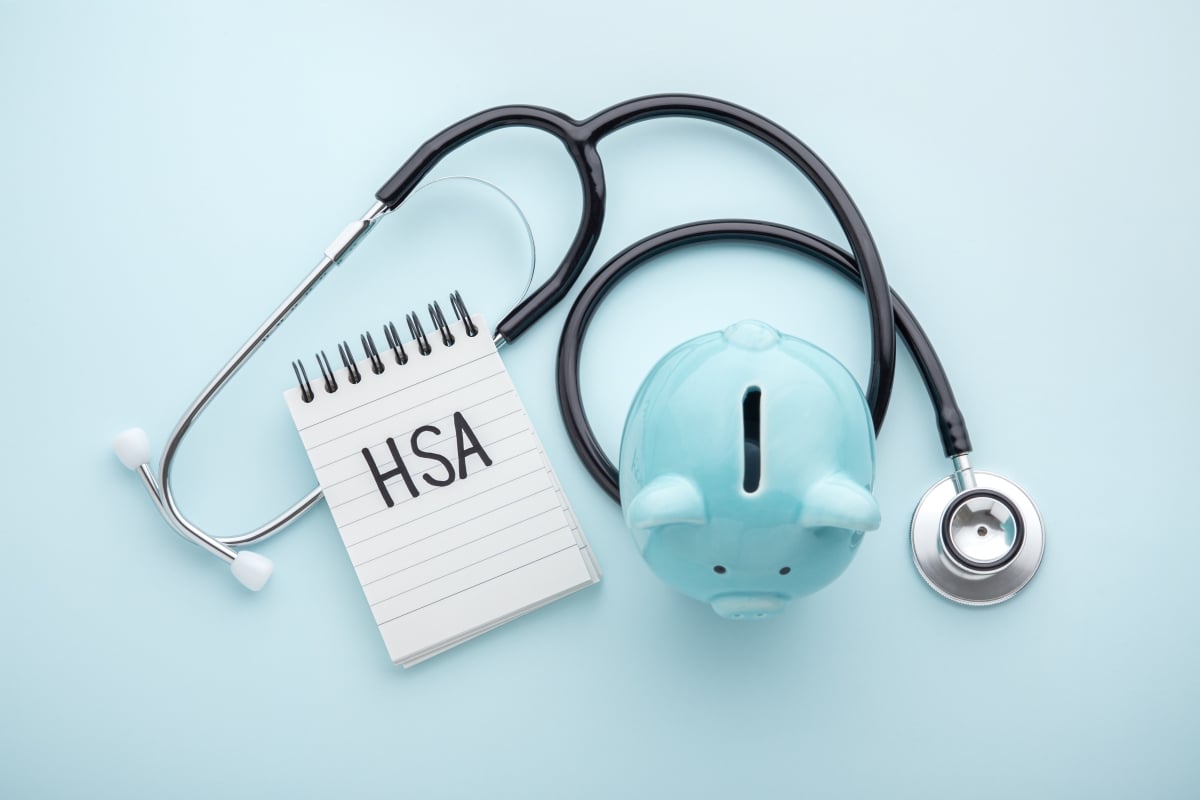A Health Savings Account (HSA) is a tax-advantaged savings account designed to help individuals with high-deductible health plans (HDHPs) pay for qualified medical expenses. What sets HSAs apart is their triple tax advantage: contributions reduce taxable income, earnings grow tax-free, and withdrawals for eligible medical expenses aren’t taxed.
For anyone looking to reduce healthcare costs, save on taxes, and even prepare for retirement, an HSA is a powerful financial tool. Here’s why it matters:
Quick Overview
- Tax Benefits: Pre-tax contributions, tax-free growth, and tax-free withdrawals for qualified medical use.
- Ownership: The account is yours, even if you change jobs.
- No RMDs: No required minimum distributions at any age.
- Investment Options: Access to numerouse investment funds and it can be used to invest for long-term growth.
- Retirement Use: After 65, funds can be used for non-medical expenses (taxed as income).
Eligibility and Contributions
To qualify for an HSA, you must enroll in a High Deductible Health Plan (HDHP). For 2025, that means a minimum deductible of $1,650 for self-only coverage or $3,300 for family coverage. Being enrolled in other coverage, like Medicare, will disqualify you.
Contributions can come from you, your employer, or even family members, and must be cash (not investments or property).
For Health Savings Account, in 2025, individuals can contribute up to $4,300 and families up to $8,550, with an additional $1,000 catch-up contribution allowed for those 55 and older.
| Coverage Type | 2024 Limit | 2025 Limit | Increase |
|---|---|---|---|
| Individual | $4,150 | $4,300 | $150 |
| Family | $8,300 | $8,550 | $250 |
| Catch-Up Contribution (Age 55+) |
$1,000 | $1,000 | No change |
Health Savings Account Benefits
HSAs offer unmatched tax perks:
- Pre-tax contributions lower your taxable income.
- Tax-free growth means the money you invest in your HSA can grow without being taxed each year – so your savings build up faster.
- Tax-free withdrawals for qualified medical expenses keep more money in your pocket.
Compared to other accounts like 401(k)s and IRAs, HSAs have no required minimum distributions (RMDs), making them ideal for long-term wealth building. The account is also fully portable – you own it outright even if you change jobs or insurance plans.
Managing Your Account
Maximizing an HSA starts with selecting the right provider – look for low fees, robust investment options, and user-friendly interfaces. Many HSA administrators offer the ability to invest your balance in mutual funds, ETFs, or other vehicles.
Keep thorough records of your contributions, distributions, and receipts. This documentation ensures IRS compliance and preserves your tax advantages. Consider using your HSA debit card for convenience, but always retain proof of qualified expenses.
Using Your HSA
HSA funds can be used for a broad range of medical expenses, including:
- Doctor visits and hospital stays
- Prescription medications
- Dental and vision care
- Overt-the-counter items like pain relievers and bandages
Keeping receipts is crucial, especially if you choose to pay out-of-pocket and reimburse yourself later – a strategy that allows your HSA investments to grow tax-free for longer.
Investment Options
HSAs aren’t just for short-term spending – they can serve as investment accounts for long-term financial planning. Investment strategies vary based on your goals:
| Investment Strategy | Cash Reserve | Investment Allocation | Best For |
|---|---|---|---|
| Conservative | 100% in cash | None | Immediate medical needs |
| Balanced | Amount equal to annual deductible |
30% stocks, 70% bonds |
Balancing current and future needs |
| Growth-Focused | 10% in cash | 50% stocks, 40% bonds |
Long-term retirement planning |
Experts recommend keeping at least enough cash to cover your deductible and investing the rest according to your risk tolerance.
Retirement Planning
When used correctly, HSAs can be a strategic retirement planning vehicle. After age 65, funds can be used for non-medical expenses without penalty (though they are taxed as ordinary income). That flexibility makes HSAs a powerful complement to 401(k)s and IRAs.
Consider these retirement-focused strategies:
- Cover current healthcare costs out-of-pocket to let your HSA grow.
- Max out contributions after funding your 401(k) or IRA.
- Use your HSA to pay for Medicare premiums, long-term care, and other out-of-pocket medical costs.
Tax Implications
The tax benefits of HSAs are a cornerstone of their appeal:
- Contributions reduce your taxable income.
- Growth isn’t taxed as long as it stays in the account.
- Distributions for qualified expenses are also tax-free.
However, distributions for non-qualified expenses before age 65 are subject to income tax plus a 20% penalty. After 65, only ordinary income tax applies.
Work with a tax advisor to stay within IRS guidelines and maximize your savings for the best results.
Comparing a Health Savings Account to Other Accounts
HSAs outperform many similar financial vehicles in flexibility and tax efficiency. Here’s how Health Savings Accounts compare to other financial accounts:
| Feature | HSA | FSA | 401(k) | IRA |
|---|---|---|---|---|
| Triple Tax Advantage | ✅ | ❌ | ❌ | ❌ |
| Withdrawals for Qualified Medical Expenses Are Tax-Free | ✅ | ✅ | ❌ | ❌ |
| Funds Roll Over Each Year | ✅ | ❌ | ✅ | ✅ |
| Account Is Yours to Keep | ✅ | ❌ | ✅ | ✅ |
| No Required Minimum Distributions (RMDs) | ✅ | ❌ | ❌ | ❌ |
Disclaimer: The information presented in this table is for general informational purposes only and is used as a broad comparison tool. Contribution limits, tax rules, and eligibility requirements are subject to change depending on the intricacies of each account type.
Unlike Flexible Spending Accounts (FSAs), HSA funds roll over yearly and belong to you regardless of employment. And unlike 401(k)s or IRAs, you can use HSA funds anytime for qualified medical expenses with no penalties.
Family and Estate Planning
HSAs can be used for qualified medical expenses for your spouse and dependents – even if your HDHP doesn’t cover them. Upon your death, the HSA transfers to a named beneficiary. If that’s your spouse, it remains an HSA; for others, it’s treated as taxable income.
To maximize long-term value:
- Set beneficiaries carefully.
- Use the account to cover family healthcare expenses and reduce taxable withdrawals.
- Include your HSA in your estate planning discussions.
Portability and Flexibility
An HSA travels with you. Change jobs, move states, switch health plans – your HSA stays intact. You can even open multiple HSAs for different strategies (e.g., short-term spending vs. long-term investing).
This flexibility allows you to build a healthcare safety net that evolves with your needs.
Health Care Integration
HSAs are designed to complement HDHPs by reducing your net out-of-pocket costs. They provide a safety buffer against large medical expenses and a way to pay for ongoing healthcare needs like:
- Preventive care
- Specialist visits
- Prescriptions
- Mental health services
When used strategically, HSAs help make high-deductible plans more manageable and affordable.
Is an HSA Right for You?
A Health Savings Account is more than just a savings tool – it’s a cornerstone of a smart financial and retirement strategy. With triple tax advantages, investment potential, and unmatched flexibility, HSAs can significantly reduce healthcare costs and support long-term financial goals.
To get the most out of your HSA:
- Confirm HDHP eligibility and stay within contribution limits.
- Invest your surplus wisely for long-term growth.
- Keep meticulous records to protect your tax benefits.
- Consider working with a financial advisor to optimize your strategy.
Whether you’re saving for next year’s doctor visits or planning decades in advance for retirement, an HSA belongs in your financial toolkit.
Greg Welborn is a Principal at First Financial Consulting. He has more than 35 years’ experience in providing 100% objective advice, always focusing on the client’s best interests.
Greg Welborn is a Principal at First Financial Consulting. He has more than 35 years’ experience in providing 100% objective advice, always focusing on the client’s best interests.
FAQ | Health Savings Account
A Health Savings Account (HSA) is a tax-advantaged savings account available to individuals who are enrolled in a High-Deductible Health Plan (HDHP). It allows you to set aside money on a pre-tax basis to pay for qualified medical expenses. Funds in an HSA can be used to cover deductibles, copayments, prescriptions, dental and vision care, and more - all while reducing your taxable income. The account is owned by you, not your employer, and the money rolls over year to year.
To qualify for an HSA, you must meet the following criteria:
- Be enrolled in a qualified High-Deductible Health Plan (HDHP).
- Not be enrolled in any other health insurance coverage (like a spouse’s plan or Medicare).
- Not be claimed as a dependent on someone else’s tax return.
For 2025, an HDHP must have a minimum deductible of $1,650 for self-only coverage or $3,300 for family coverage, along with a maximum out-of-pocket limit of $8,300 (individual) or $16,600 (family).
The IRS sets annual contribution limits for HSAs, which adjust for inflation. For 2025, individuals can contribute up to $4,300 and families up to $8,550. If you're 55 or older, you can contribute an additional $1,000 as a "catch-up" contribution. These contributions can come from you, your employer, or both combined, but they cannot exceed the annual limit.
HSA funds can be used to pay for a wide range of qualified medical expenses, including doctor visits, prescriptions, vision and dental care, and even some over-the-counter medications. If you use the funds for non-qualified expenses before age 65, you'll pay regular income tax plus a 20% penalty. After age 65, you can use the money for any purpose without a penalty - though non-medical expenses will still be taxed as income.
Yes, many HSA providers allow you to invest your HSA funds once your balance reaches a certain threshold, often around $1,000 or $2,000. You can invest in mutual funds, ETFs, and other securities. This gives your HSA the potential to grow significantly over time, especially if you don’t need to tap into it for short-term medical costs.
Your HSA is yours to keep, no matter where you work or what health insurance you have in the future. It's a portable account, meaning you can continue using the funds for qualified medical expenses even if you're no longer enrolled in an HDHP. However, you can only contribute to the HSA while you're actively covered by a qualifying HDHP.
Yes, you can use your health savings account for non-medical expenses. However, there are conditions you must meet.
If you're under age 65, using HSA funds for non-qualified expenses will result in income tax plus a 20% penalty.
If you're 65 or older, you can withdraw funds for any purpose without penalty - though non-medical expenses are still taxed as regular income (similar to a traditional IRA).
This makes the HSA a potential secondary retirement account for those who stay healthy and don’t use all their medical savings.


